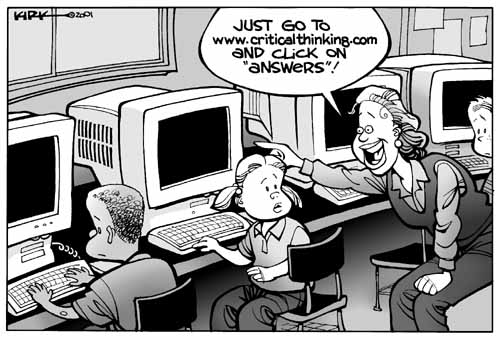Lesson 14: Critical Thinking
Attention

It really, really, is NOT this easy!!
Learning Outcomes
Upon completion of this lesson's material, students will be able to:
- Identify forms of logical reasoning and theories of epistemology
- Distinguish between fact and opinion
- Distinguish between proactive and reactive approaches to problem solving
- Incorporate strategies of creative thinking into academic life
Teaching
Critical Thinking, the ability to solve problems and understand complex ideas, is fundamental to being a successful college student and a professional and to handling difficult decisions in life. Critical thinkers can process, analyze, and conceptualize what one hears, sees, and reads, and remains skeptical and can recognize ideological arguments or indoctrination.
Imagine if Bernie Madoff’s investors had used proper critical thinking his ponzi scheme could not have happened! Imagine if people who bought houses at inflated prices with adjustable rate mortgages had used proper critical thinking, how much financial pain could have been avoided!
Critical thinkers are naturally skeptical, can put diverse information into a coherent context, and can analyze evidence supporting a claim or argument, leaving emotions out of the process.
These skills are especially essential when researching on the web where the user must evaluate the reliability of the information.
Review the following web sites and list the key ingredients of critical thinking.
http://www.sjsu.edu/depts/itl/index.html
http://www.ithaca.edu/library/training/think.html
http://www.library.ucla.edu/libraries/college/11605_12008.cfm
Assessment
Lesson 14 Quiz
- Review and evaluate the information on the following website. Use critical thinking skills to determine how valuable each of these sites are for conducting research.